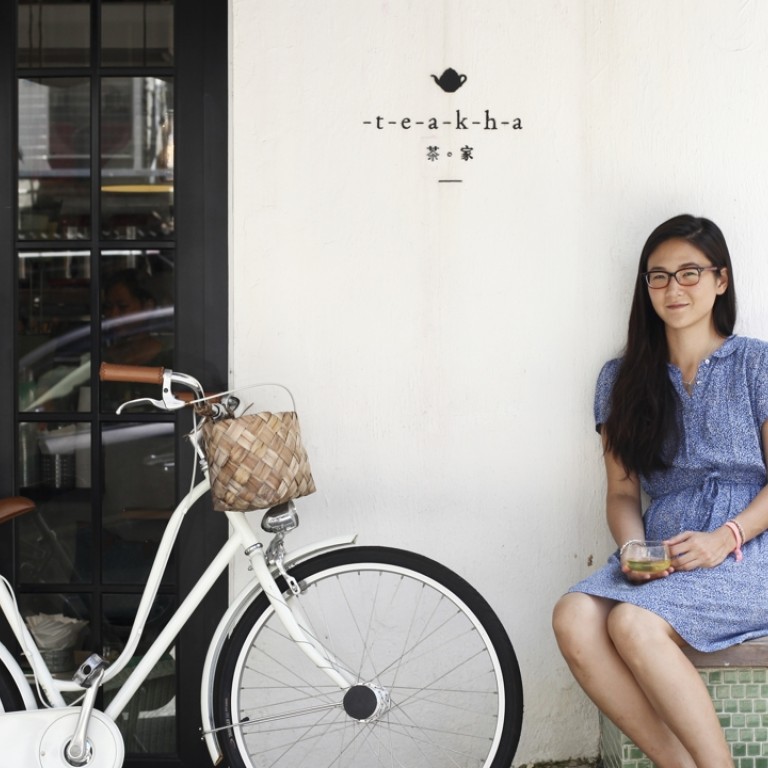
Young Hong Kong tea connoisseurs on mission to make drink cool again
Three local brands started by millennials offer high-quality teas that are sourced ethically from around the world
Whether it’s the tepid brew used to rinse your utensils at your local cha chaan teng, the inky pu’er served with dim sum or the delicately brewed Earl Grey as part of an afternoon tea service, tea is almost as ubiquitous in Hong Kong as the water in which we brew it.
Possibly because it is so common, tea seems to attract little attention these days, compared with its cousin in the beverage world, coffee. But three young entrepreneurs in Hong Kong, who also happen to be tea connoisseurs, are trying to conjure up interest in the mighty leaf.
“I always loved tea as a child and found it hard to find good tea shops in Hong Kong. Traditional tea shops tend to be very stuffy, formal affairs, but to me tea is a relaxing experience, like reading a book or gathering with friends and family. I wanted to recreate this experience at Teakha,” she says.
Tea is part of the daily lives of many and there are tens of thousands of varieties, but we found that people tended to stick to one or two staples. And it’s not because they’re not curious, they just find it too much hassle to randomly try teas
By extension, with Plantation Chan says she hopes to make tea “a casual and fun affair while maintaining the highest quality possible”. For example, she says Plantation has created its own hand-tied teabags.
“Through four years of experimenting with recipes at our cafe, we’ve been able to develop a range of teas that are easy to drink, beautiful to look at, taste delicious and often carry meaningful stories behind them.”
Christopher Tan, who started online tea company TeaCha last year, says: “Tea is part of the daily lives of many and there are tens of thousands of varieties out there. But we found that people tended to stick to one or two staples. It’s not because they’re not curious, they just find it too much hassle to randomly try teas and end up wasting the ones they may not like. But you don’t need to follow a tea master or personally try every tea out there.”
For Tan, it’s about injecting fun and experimentation into tasting and giving curious drinkers “a worldwide tasting experience and genuine education about each and every tea they try – and then letting them pick their tea”. His company’s flagship product is a subscription service that delivers five different teas monthly that are, in his words, “flavourful, distinctive, and perfect for drinking during specific seasons”.

Since colonial times, tea has had an unfortunate history of exploitation. In recent years, a number of certification systems have attempted to tackle the ethical and environmental aspects of tea production. Tea companies and consumers are now more concerned about the integrity of sourcing. Last year, a BBC investigation revealed the lack of enforcement of a particular certification, Rainforest Alliance, which saw plantation workers in less than humane conditions and using excessive amounts of chemicals.

Freeman speaks passionately about sourcing and the plight of tea farmers and plantations. “All of our teas are handpicked and use processing techniques that have often been handed down the family line for generations. I have a personal relationship with our farmers who ship our teas straight from their farm. Buying tea directly from small local farms not only helps to support the production of more unique teas, but also helps to disperse the concentration of power and wealth.”
To these tea purveyors, ethics and integrity go hand in hand with quality, and they have gone far and wide in search for the best. Tan spent two years visiting tea plantations and tasting more than 1,300 teas to reach his current repertoire of 65; Freeman is looking into remote regions such as southern Laos and Chan has found some of the last remaining growers in Hong Kong and chosen her favourites from the many plantations in Taiwan.

Freeman appreciates the character of single estate teas. “Our Ancient Moonlight Premium White tea, for example, uses only the buds of the tea tree and is handpicked from March to May during the full moon as it is believed that this helps to capture the moon’s energy,” she says.
“We do have a number of signature blended teas and herbal infusions which we make by hand in-house. For these blends, we peel fresh fruits, dehydrate them and mix them with spices, herbs and the tea depending on the individual blend.”
While all three companies distribute to the public via online sales and work with hotels and restaurants, don’t expect to find these small batch teas on every supermarket shelf any time soon.
“The nature of our business means that we would never be able to supply each branch of Peerie Tea with the same teas, but that in itself, I think, is pretty neat,” says Freeman.
Where to drink:
Plantation
Teakha, 18 Tai Ping Shan Street, Sheung Wan, tel: 2858 9185
Teakha II, 18 Po Tuck Street, Sai Wan, tel: 3956 9009
Peerie Tea
Steak Frites by The Butchers Club, UG/F, 52-56 Staunton Street, Central, tel: 2858 9800
Grassroots Pantry, 108 Hollywood Road, Sheung Wan, tel: 2873 3353
Where to buy:
Plantation
Teakha, 18 Tai Ping Shan Street, Sheung Wan, tel: 2858 9185
Teakha II, 18 Po Tuck Street, Sai Wan, tel: 3956 9009
Peerie Tea
peerietea.com
ButchersBarrel, 17 Shelley Street, SoHo, tel: 2530 3170
TeaCha
teachatea.com
HKTDC Design Gallery, HK Convention and Exhibition Centre, 1 Harbour Road, Wan Chai, tel: 2584 4146
